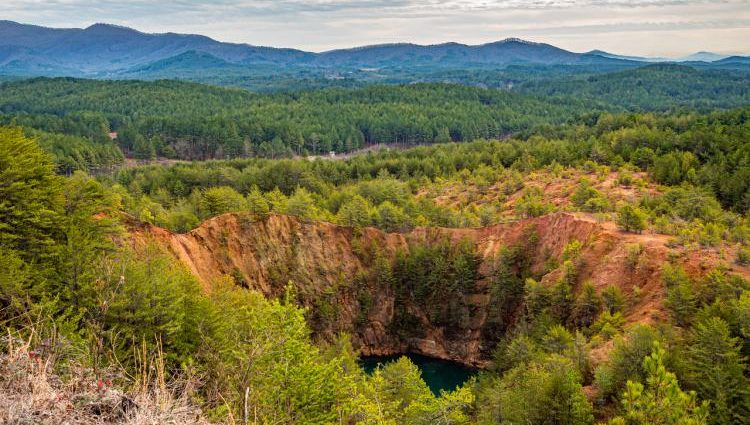My December 2019 side trip off Highway 68 to Ducktown was inspired by Edward Francisco’s “Copper Hill – A Legacy,” posted in September. I also had seen the “moonscape” as a child and swam in the sulfur-scented, olive-tinted water downstream. The mines and processing plants are closed; yet, their legacy and many of the stories from the people who lived and worked there are preserved at this Copper Basin site. The following photos and text are a small sample from a mother lode of artifacts and lore. For those who want to dig deeper, click on the hyperlinks to more authoritative sources, or, better yet, visit the museum.
The Ducktown Basin Museum (Facebook page) sits on the edge of a Polk County, Tennessee hilltop plateau at the Burra Burra Mine State Historic Site. The paved drive to the L-shaped, gray building is surrounded by mysterious mining artifacts and a puzzling variety of restored structures: an intriguing preview of the complex story told in the former mine office (Figures 2 – 7) and on the self-guided walking tour outside (Figures 1; 8 -17). Across the lot from the museum entrance, a steel-girded viewing platform overlooks a dizzying plunge into a flooded 350 feet deep pit (Figure 1) formed by a caved in section of an abandoned mine shaft. Contrary to first impressions, this area was never strip mined.
I was greeted warmly at the entrance counter by Dawna Standridge (Figure 2), my ticket clerk and guide. After a brief historical video presentation, Mrs. Standridge told her story of growing up in Ducktown during its heyday. The mine where her father, J. L. McHan, worked provided a good life for the family. They rented a company home for five dollars a week. The company houses were arranged in a hilltop hierarchy: the mine superintendents lived in fancy dwellings (Figure 11 Below) at the top of the hill; the managers’ more modest homes were further down; and the workers’ bungalows, where the McHans resided, were at the lowest level. The company store was well stocked – the only items not for sale were “cars and whisky.” While car salesmen were absent, local folks knew where to the find the bootleggers in this dry county. Mr. McHan kept meticulous track of what the family got at the store and knew to the penny what the draw would be from his paycheck. The company made sure the store carried the latest fashions so the bosses’ children could “go home in their best.” The company also hired extra teachers for the local schools.
In 1962, Dawna married a mine machinist. After two years on a waiting list, they moved into a company house of their own. The rent stayed five dollars a week until 1987, when the last mine closed. The company sold them their home and three to four acres of land for $2400. A Piggly Wiggly now sits where that home once was, and they obtained a better house in a trade with the store owner for theirs. Mrs. Standridge “has no bad memories.” To her, the bleak, eroded landscape was “beautiful;” she liked the brilliant colors when the sun shone on the red-tinted hills, “…like the Grand Canyon…We didn’t have bugs or snakes and we didn’t have allergies.” Once the reclamation efforts took hold, the pests returned – now she’s back to “killing copperheads” outside her home.
When I queried about possible health consequences from living so close to the mine works, Mrs. Standridge noted that the miners had problems with silicosis from the rock dust in the shafts, especially before modern safety measures were implemented. Still, she raised three healthy children who all chose to stay in the region with their families. Her son, a mechanical prodigy, soaked up his father’s technical savviness. At age fourteen he was fixing household gadgets, by sixteen he was a certified appliance repairman. His business, Stoney’s Appliance Repair, serves a five-county area. Her daughter Amy is a pharmacist and owner of the uniquely stocked Brasstown Pharmacy Drug and Gun; her other daughter, Sonya, is a nurse.
While my sample size of one is short on local feedback, the museum sells an Old Time Productions’ DVD, “It’s Home: Memories of the Ducktown Basin,” featuring interviews with eighteen residents who were there when the region was booming. In this music video from the documentary, the lyrics and the vintage photos are bittersweet testaments to their history. The pollution and the harsh landscape are acknowledged, but there is pride in the work they did and the life they lived, poignantly summed up in the final words: “It’s home.”

Dawna Standridge has worked at the museum nineteen years. The case contains a flow diagram of the many steps from mining the ore to the processing of the final products. The containers on the circumference of the circle display samples of the end products (e.g. copper sulfate, magnetite, ferro floc . . . etc.).

















Beautiful job, Jimmy.
Thanks Eddie. Appreciate your “inspiring” me (with a little extra nudge) to do this piece.
Lovely!
There’s no place like home! Going to have to re-visit the place: the 1960s were a long time ago.